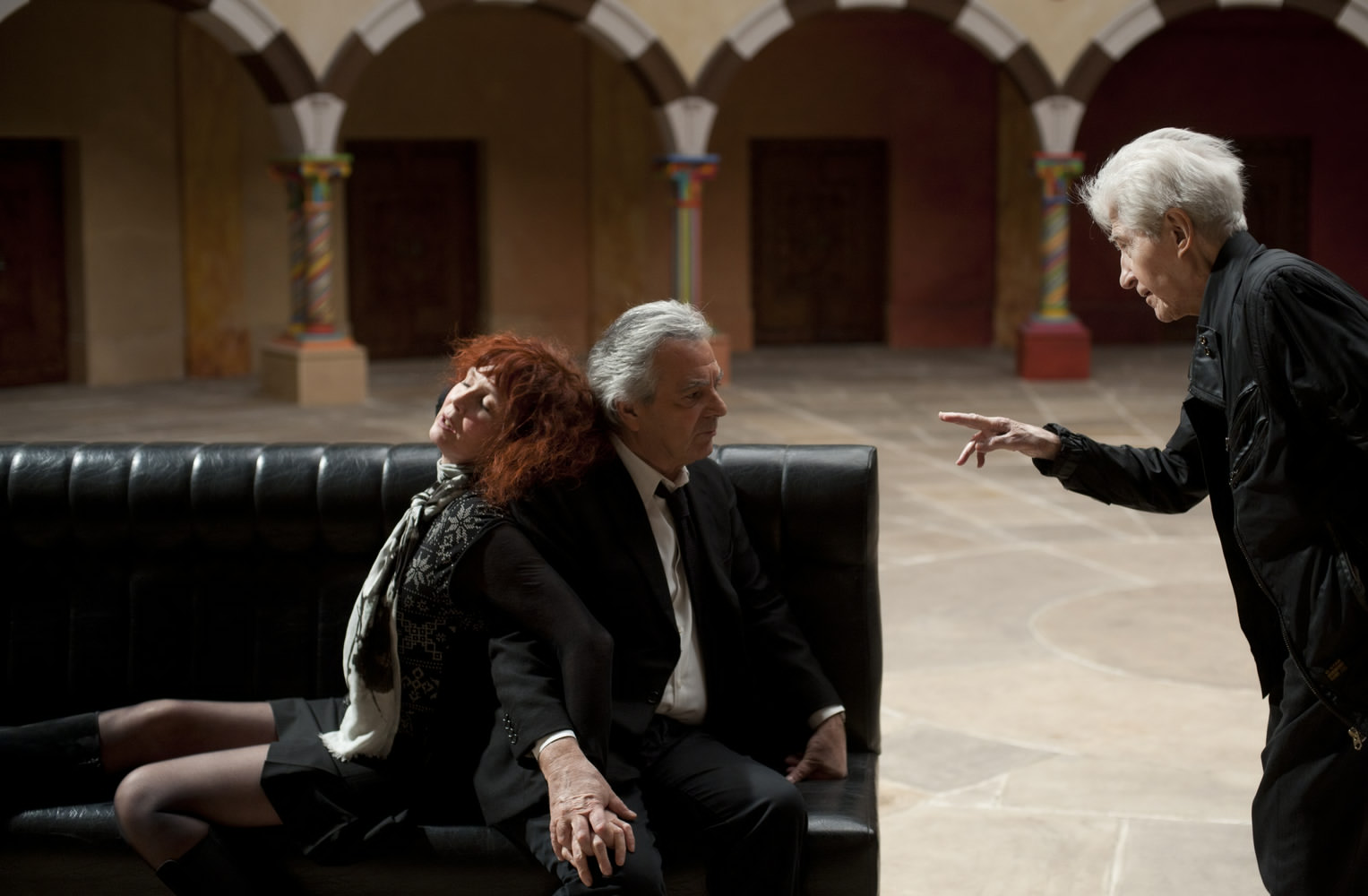Title: You Ain’t Seen Nothin’ Yet (Vous n’avez encore rien vu)
Kino Lorber
Director: Alain Resnais
Screenwriter: Laurent Herbiet, Alex Reval, based on Jean Anouilh’s “Eurydice” and “Dear Antoine”
Cast: Mathieu Amalric, Pierre Arditi, Sabine Azéma, Jean-Noël Bouté, Anne Cosigny, Denis Podalydès, Hippolyte Girardot, Michel Piccoli, Lambert Wilson
Screened at: Review 1, NYC, 5/28/13
Opens: June 7, 2013
If you’re a fan of theater—and I mean cerebral theater, not “Cats” or “The Lion King”—you may have run across Luigi Pirandello’s 1921 play “Six Characters in Search of an Author,” one of the best examples of metatheater. In that imaginative work, an acting company prepares to rehearse the play “The Rules of the Game” by Luigi Pirandello. As the rehearsal is about to begin the play is unexpectedly interrupted by the arrival of six strange people. The Director of the play, furious at the interruption, demands an explanation. The Father explains that they are unfinished characters in search of an author to finish their story. The Director initially believes them to be mad, but as they begin to argue amongst themselves and reveal details of their story he begins to listen. While he isn’t an author, the Director agrees to stage their story despite the disbelief amongst the jeering actors. The surreal action juxtaposed against the more realistic concept of a troupe’s preparing to stage something different, is a commentary on the theater experience itself. Hence the term “metatheater.”
When Alain Resnais, the eighty-nine year old director gives us in the audience “You Ain’t Seen Nothing Yet” (which is more serious and somber than the playful title would indicate), he is in the same park as Pirandello, staging a work that is a comment on theater; not only on theater but on the ways that the cinema can actually make a stage play come to life for an audience, using a screen large enough to enable those of us sitting in the last row or way on the side to see and hear everything. If you’ve been given assigned seats in Broadway Siberia, you know how difficult it is to be involved in a talky play—and if nothing else, “You Ain’t Seen Nothing Yet” is a talky play.
Alain Resnais, known for complex, cerebral films “Hiroshima Mon Amour” and “Last Year at Marienbad,” will never be mistaken for the writer or director of the “Fast and Furious” series. Instead he appeals more to what’s above the audience necks than below, more cerebral than emotional, although some folks might disagree with me. “You Ain’t Seen Nothing Yet” is no exception. In no way trying to equal the lush design of “Last Year at Marienbad,” this latest Resnais endeavor appears to be done in greenscreen, parts taking place in a train station diner and a hotel room.
The playfulness begins even with the opening credits, imitating the designs of French cinema during the thirties and forties. The emphasis on repetition is seen at first when the butler of playwright Antoine d’Anthac (Denis Podalydès) calls thirteen people, telling each of bad news. The writer is dead. He summons the actors to one of the playwright’s homes and plays a tape showing a rehearsal a new interpretation of d’Anthac’s “Eurydice” (actually written by Jean Anouilh) As the young pair playing Orpheus and Eurydice go through the play, the older actors sitting on sofas, all of whom had taken part in “Eurydice,” become caught up and begin to repeat the lines of the youths in the video. The principal action involves the red-haired Sabine Azéma and Pierre Arditi in the roles, with a neurotic, clinging Eurydice making Orpheus swear that he will never leave her. Similarly a younger couple played by Lambert Wilson and Anne Consigny deliver their roles by memory as well.
The whole enterprise is stodgy, on life support from the neck down, making the film a difficult slog through the stodgy performances. Audience members could not be faulted for wanting the veterans to bow out after a few minutes and letting the youths rehearsing in the warehouse (Vimala Pons, Sylvain Dieuaide) strut their stuff until their love becomes doomed.
Embracing the entire project is the commentary on the loyalty and love that the veteran actors feel for their director. With music by the American composer Mark Snow and some fancy editing by Hervé de Luze featuring some jump cuts and split screens, the film ends with a coup de théâtre, a surprising twist—which has come far too late to enliven the proceedings.
Unrated: 115 minutes. © 2013 by Harvey Karten, Member, NY Film Critics Online
Story – B
Acting – C
Technical – B-
Overall – C+

